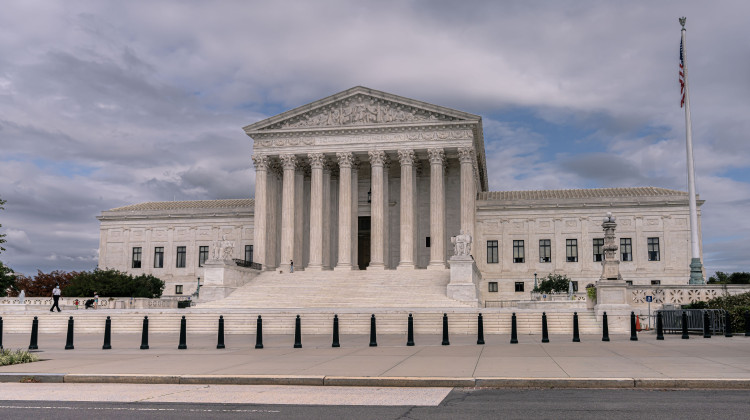
The U.S. Supreme Court heard oral arguments Tuesday in Health & Hospital Corporation of Marion County (HHC) v. Talevski, a case that involves an Indiana nursing home and Marion County public health agency.
Adam Szuscik/UnsplashThe U.S. Supreme Court heard oral arguments Tuesday for a case that involves an Indiana nursing home and a Marion County public health agency. The case has captured national attention due to its far-reaching implications for federal safety net programs across the country.
The arguments addressed two questions: Do people on federal assistance programs like Medicaid have the right to sue states in federal court if their rights are violated? And do nursing home residents have the right to bring civil rights lawsuits against government-owned nursing facilities?
A ruling in favor of the Health and Hospital Corporation of Marion County could strip millions of people who rely on federal assistance programs, including Medicaid, of the right to sue government agencies when they do not receive benefits allowed by federal law.
After oral arguments, some legal experts say the Supreme Court seems unlikely to undo decades of legal precedent that establishes the right of Medicaid recipients to sue states. The court appears, however, to be more receptive to a narrower argument: that nursing home residents in government facilities may not have the same right to sue states in federal court.
Many legal experts say the civil rights law known as Section 1983 grants private citizens the right to sue government agencies and officials if they violate their constitutional rights.
But HHC, which owns more than 70 nursing homes across Indiana, argues that the right to sue does not extend to nursing home residents and people who rely on federal assistance programs.
Thomas Fisher, the Indiana solicitor general, argued in support of HHC. He said the cases lower courts use to evaluate whether a federal law establishes an enforceable right have been confusing for states and courts.
In reply, Chief Justice John Roberts said the legal precedent regarding which laws give rise to rights under Section 1983 are clear and impose a “pretty high bar in terms of the evidence that was required.”
Roberts asked: “Why isn’t that sufficient?”
Some legal experts told WFYI that Roberts’ skepticism of the Marion County agency’s argument was among the most telling moments during the oral arguments, because Roberts represents a crucial swing vote that could ultimately decide the case – or at least its first question of whether Medicaid beneficiaries have the right to sue government agencies.
An attorney representing HHC and the Indiana solicitor general argued that because Section 1983 was enacted by Congress in the 19th century, it could not have been intended to give third parties the right to sue to enforce a government contract. At that time, the attorneys said, common law for contracts did not confer that right.
Justice Ketanji Brown Jackson countered, saying Congress enacted Section 1983 specifically as a vehicle for everyday people to be able to sue states and government officials who violate federal law and their civil rights. Jackson said it seems “odd to suggest that we as a court can reinterpret the word ‘law’ in Section 1983 to carve anything out.”
Justice Amy Coney Barrett also joined Brown’s questioning of HHC’s lawyers’ arguments, and said she cannot see “the connecting of the dots.”
While the justices seemed unlikely to limit the right of people on federal assistance programs to sue, some justices appeared receptive to arguments questioning whether that right extends to nursing home residents.
Benjamin W. Snyder, assistant to the U.S. solicitor general, argued that at the time the Federal Nursing Home Reform Act was adopted by Congress in 1987, nearly 90 percent of nursing homes in the U.S. were privately owned.
He said that it seems Congress believed other remedial and enforcement mechanisms, such as administrative procedures, were sufficient for those nursing home residents without the need for recourse from federal courts.
“Congress contemplated providing a private cause of action against those private parties, but left that out of the ultimate bill it enacted,” Snyder said.
Justice Brett Justice Kavanaugh responded, “That's an unusual line to draw on. [It] would be a new line in the case law. That's not to say it's not a good line here. But it would be different.”
Unlike in most of the country, government agencies own the vast majority of the nursing facilities in Indiana, as well as Pennsylvania. Justice Sonia Sotomayor questioned why the court should assume that Congress wanted to take away the right of residents at these facilities to use Section 1983 “as an additional remedy for a violation of a state obligation.”
A decision on the case could come as late as June 2023, the end of the court’s term.
Paul Garcia, a partner in the regulatory department of national law firm Hooper, Lundy & Bookman in California, has been following the case. He said many legal experts and patient advocates seem to be breathing a cautious sigh of relief after the oral arguments.
“I thought… the real question before the court was, are they going to issue a normal decision? Or are they going to drop another bomb like the Dobbs decision” that resulted in the overturn of Roe v. Wade, Garcia said. “My takeaway was, the court seems reluctant to drop another bomb.”
But Ben Geffen, senior attorney at the Public Interest Law Center in Pennsylvania, said a decision not in favor of nursing home residents may be likely. Such a decision could make it harder for people in government-owned nursing homes to enforce their rights.
“I guess the silver lining is that a result like that probably would be restricted to Indiana and Pennsylvania, because as a practical matter, those are the two states where this is currently how it's run,” Geffen said.
This story comes from a reporting collaboration that includes the Indianapolis Recorder and Side Effects Public Media — a public health news initiative based at WFYI. Contact Farah at fyousry@wfyi.org. Follow on Twitter: @Farah_Yousrym.
 DONATE
DONATE






 Support WFYI. We can't do it without you.
Support WFYI. We can't do it without you.